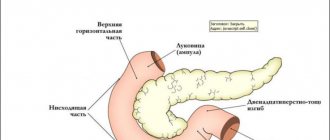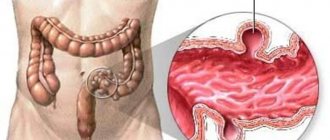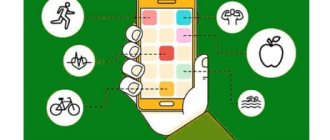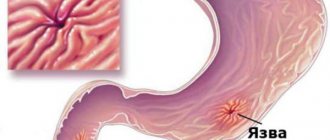In diseases of the pancreas, its ability to produce enzymes is impaired. These are substances that are of great importance for the digestion of food. To maintain organ function, it is recommended to take pancreatic enzymes, drugs containing the same substances as natural gastric juice.
medicines for pancreas
Types of enzymes
There are several types of digestive enzymes, each of which is capable of breaking down a specific compound:
- Alpha amylase or ptyalin . It is produced by the salivary glands and begins to break down complex carbohydrate compounds (starch) already in the oral cavity into simpler ones (dextrose, sucrose, maltose).
- Pepsin . An enzyme produced by the “master” cells of the stomach. As part of gastric juice, it breaks down protein compounds into peptides under the influence of gastric juice.
- Trypsin . The enzyme, similar in function to pepsin, but produced by pancreatic cells, also breaks down protein compounds into individual peptides that are available for absorption.
- Chymotrypsin . An analogue of trypsin, also produced by the pancreas.
- Elastase . Produced by the pancreas. The only enzyme capable of breaking down elastin is a protein found in meat foods. It is not destroyed during the passage of food and can be a diagnostic marker of pancreatic enzymatic insufficiency.
- Amylase. Synthesized by the pancreas, it continues to break down carbohydrates that alpha-amylase cannot cope with.
- Lipase. The main enzyme capable of breaking down fats is secreted by the pancreas. Breaks down triglycerides to higher fatty acids and glycerol.
- Alanine aminopeptidase and enteropeptidase. Enzymes produced and act in the small intestine, continuing the breakdown of food proteins.
- Sucrase, maltase and lactase. Small intestinal enzymes that help break down complex carbohydrates.
- Intestinal lipase. Continues to break down fats and is produced in the small intestine.
- Hemicellulase. Secreted by intestinal microflora, it promotes the breakdown of complex carbohydrate compounds, in particular cellulose.
Read on the topic: Digestion time of food, easy and difficult to digest foods
https://youtu.be/fbR0C6LngcY
List of enzyme preparations
Enzyme preparations are also usually divided into groups, depending on the main active ingredient and composition of the drug:
- Pancreatin-containing drugs: Pancreatin, Mezim-forte, Penzital, Pangrol, Creon and others.
- Complex enzyme preparations. In addition to pancreatin, the composition contains bile, hemicellulase, pancran, enzistal and others.
- Lipolytic combination drugs: Somilase, Solyzyme and others.
Pancreatin
Popular, affordable drug. The main purpose is the breakdown of protein foods. Indications for use are:
- to optimize digestion in case of errors in the diet (overeating, loose stools of a non-infectious nature, etc.);
- before endoscopic examinations;
- severe bloating;
- pancreatic insufficiency (various pancreatitis, cystic fibrosis, and so on);
- functional digestive disorders in childhood;
- exposure to radiation therapy or contact with radioactive substances;
- chronic inflammatory diseases of the upper gastrointestinal tract (cholecystitis, gastritis, gastroesophageal reflux disease, peptic ulcer, and so on).
Mezim
In addition to pancreatin, the drug contains enzymes and lipase. It acts more gently than pancreatin and is approved for use even by children. The drug Mezim-forte 10000 is similar to pancreatin.
Indications for use are almost the same as for pancreatin. It refers not to therapeutic, but to prophylactic drugs intended to prevent and prevent further aggravation of the condition in diseases such as chronic pancreatitis, gastroduodenitis, cholecystitis. The main point of application is overeating and functional digestive disorders.
Penzinal
The drug is an analogue of pancreatin, but contains more active enzymes. Recommended for the treatment of acute conditions:
- acute pancreatitis and pancreatic necrosis;
- condition after removal of the gallbladder;
- condition after resection of the stomach, intestines;
- a period of dehydration that lasted a long time, etc.
After stabilization of the processes, it is recommended to switch to weaker enzymatic preparations (Pancreatin, Mezim).
Micrasim
Capsule drug that dissolves at the intestinal level. Gastric juice has no effect on the capsule, and it transits into the duodenum, where active substances are released under the influence of intestinal juice.
Used for:
- pancreatic insufficiency;
- condition after removal of the gallbladder, resection of the stomach and part of the intestine;
- cystic fibrosis;
- tumors of the upper gastrointestinal tract;
- violations of evacuation and movement of intestinal contents (intestinal paresis, partial and complete intestinal obstruction), etc.
Creon
A drug whose main advantage is a capsule capable of partially releasing enzymes. The capsule dissolves in the stomach, the microgranules have an enteric coating, so they penetrate unchanged into the intestines, where the drug begins its work, moving further along with the chyme.
Main purpose:
- cystic fibrosis, the best solution in childhood;
- pancreatic necrosis;
- removal of part of the pancreas with severe enzymatic deficiency;
- oncopathology of the gastrointestinal tract;
- Shwachman-Diamond disease and others.
Somilaza
The drug contains two enzymes: lipolytic solizyme and alpha-amylase. All components are obtained from plants. The drug is indicated exclusively for pancreatic disorders associated with lipolysis deficiency. Can be used in cases of poor diet and excessive consumption of fatty foods to simplify digestion.
Often causes allergic reactions due to the presence of plant components. Unlike previous names, which are taken with food, the drug must be taken after meals.
Enzistal
The combined drug contains bile components, thereby increasing the activity of its own enzymes. It is mainly used for chronic cholecystitis, cholelithiasis, hepatitis, cholangitis and after removal of the gallbladder - in case of insufficient digestion and bile deficiency.
Taken after meals. May cause nausea and even vomiting if the drug is overdosed.
Read on: How long should you wait between meals?
Pepphysis for the treatment of pancreas
To maintain the functioning of the digestive tract, multicomponent drugs are prescribed.
Pepphys has a good effect. This drug is notable because it belongs to the category of carminative drugs. Accelerates the motor functionality of the gastrointestinal tract, reduces the formation of gases in the abdomen, normalizes the process of food digestion due to the presence of enzymes. The medication is available in effervescent tablets. Consists of fungal diastase, papain, simethicone. Prescribed for liver diseases, chronic pancreatitis, non-ulcer dyspepsia syndrome, enteritis, flatulence.
Prohibited for use in children, pregnant and lactating women. Prescribed with caution in the development of arterial hypertension, liver and kidney pathologies.
The tablet dissolves in water. The finished drink is consumed after meals. Frequency of application 2-3 times a day.
In what cases are enzymes prescribed?
Pancreatic enzymes are far from harmless drugs. Their prescription should be supervised by general practitioners or gastroenterologists. The main indications for which their use is necessary:
- pancreatic insufficiency due to inflammatory diseases of various etiologies (autoimmune, alcoholic, pancreatic necrosis, after dietary disorders, etc.), oncological processes and gland resection;
- inflammatory diseases of the gastric and intestinal mucosa to improve food digestion and facilitate absorption;
- in case of bile deficiency due to inflammatory diseases of the liver, its ducts, gallbladder, as well as after operations to remove the bladder and liver resection;
- single or short-term use for functional digestive disorders (after dietary disorders - loose stools, heartburn, nausea) and for overeating.
Signs of poor digestion and poor metabolism
Such a violation can be recognized by a number of characteristic signs:
- there is severe hair loss, skin problems and a deterioration in general well-being, since the body cannot obtain enough vitamins from the food it eats;
- due to metabolic disorders, disturbances may appear in the internal organs, and a sharp increase in body weight is noted;
- in addition, the patient complains of constant heaviness in the abdominal area; problems such as belching, increased gas production, and constipation may occur;
- the skin color becomes unhealthy, closer to gray or pale, the color of the nail plate changes, and a coating on the tongue may appear;
- many patients, despite the fact that food is digested very slowly, begin to eat much more, which further increases the load on the gastrointestinal tract and contributes to weight gain;
- in the evening and after eating, many complain of heartburn, which may be associated with rotting processes in the stomach.
Causes of slow digestion
Attention! A similar condition can also occur against the background of exacerbation of chronic gastrointestinal diseases. In this case, it is not enough to take only stimulant medications, since it is important to conduct a full examination and prescribe a combined treatment regimen.
Contraindications
Enzymes have their contraindications, especially when they contain plant or animal ingredients:
- allergic reactions to the components of the product;
- gout, since drugs can further increase the content of uric acid salts, this condition is called hyperuricosuria;
- “lazy” pancreas syndrome – when there is no indication, but the drug is taken regularly, the gland stops producing enzymes itself and withdrawal syndrome develops when enzyme therapy is stopped.
The consequences of taking pills to improve digestion and metabolism
The consequences of using tablets of this type depend on what type of medication the patient chooses. When using dietary supplements, there are rarely consequences more dangerous than an allergic reaction in the form of a rash or intestinal upset. But sometimes they can provoke diarrhea, vomiting and even anaphylactic shock if the composition turns out to be allergenic for a particular patient.
Rules for good metabolism
When using enzyme pharmaceutical tablets, truly dangerous consequences rarely appear, which are often associated with an incorrectly selected dose, increased sensitivity, or the patient’s self-therapy, when the compatibility of all medications is not taken into account. When taking enzymes, you may encounter problems such as nausea, vomiting, constipation, diarrhea, rash, and hives. Rarely, irritation of the oral mucosa occurs.
The most dangerous drugs are those that are combined and are designed to combat obesity or have a hormonal component. They can inhibit kidney and liver function and affect the functioning of the central nervous system. In severe cases, they caused not only the classic signs of indigestion, but also fecal and urinary incontinence, the passage of fat in the stool, loss of consciousness and severe exhaustion.
Tips for Improving Digestion
Hormonal medications quickly relieve digestive problems, but only until they are discontinued. As a result, the patient regains the lost kilograms and takes with him new ones. But most of all, the endocrine and reproductive systems are destroyed. This is why it is so important to follow the instructions when taking such tablets, which can only be used in strictly defined cases.
Attention! If you have real problems, taking this type of medication is not prohibited. But only a nutritionist should select pills, taking into account the obtained blood, urine, hormonal levels and the functioning of other systems.
If signs of insufficiently fast metabolism or a clear deterioration in digestion appear, you should also adjust your diet and identify the exact cause of the disorder. Without eliminating the underlying pathology and lacking healthy eating rules, taking any pills will only give a temporary effect. In the presence of obvious gastrointestinal pathologies, the use of stimulating enzymes can continue for several years. But throughout the entire treatment, it is important to monitor the state of the digestive system and stop taking the pills at the first opportunity.
Is taking enzymes justified or can it be avoided?
Enzyme preparations must be prescribed strictly according to indications. Excessive use of drugs of this pharmacological group leads to a significant decrease in the function of the pancreas itself and even sometimes to atrophy of the gastric mucosa and cells that secrete enzymes as they are no longer needed.
In severe condition of the patient, with insufficient digestion and poor absorption, replacement therapy is necessary. With insufficient digestion, not only cachexia can develop with normal appetite and good nutrition, but also significant vitamin deficiencies.
Depending on the pathology, the doctor calculates the dosage and indicates the duration of administration. Sometimes, after long-term use, gradual withdrawal of the drug over several days or weeks is recommended. The pancreas is activated to work in a standard mode after unloading.
Read on the topic: How to behave after a hearty lunch: good and bad habits
Basic recommendations for improving enzymatic activity
Basic recommendations for good and proper digestion:
- Proper nutrition. This concept includes not only dietary products, but also a rational regimen (eating at strictly regulated times, at least three times a day, in equal portions).
- Active lifestyle. Sport improves intestinal motility, increases the tone of the bile ducts and pancreatic ducts, improving the evacuation of secretions.
- Increase the consumption of clean water to 2-2.5 liters. It promotes better dissolution of compounds and facilitates absorption, softens the chyme and facilitates its movement through the intestinal tube.
- Chew food slowly. In ancient Japan, samurai chewed a portion of rice, counting 40 chewing movements. Well-mechanically processed food is easier to digest, salivary enzymes have time to break down more compounds, making further work easier.











